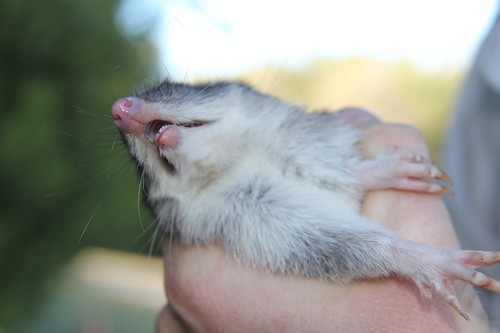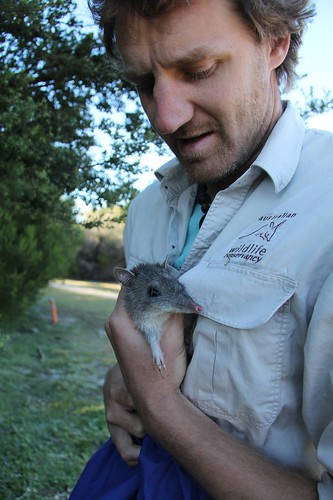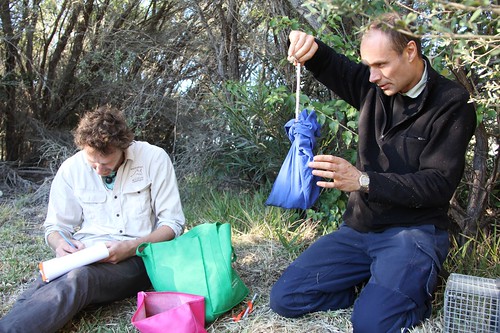Monthly Archives: July 2012
Two science papers – North Heads Residency
These two papers shed some light on the challenges faced at North Heads.
From the abstracts ..
The use of Population Viability Indices in making long-sighted urban conservation decisions.
banks2004_AustZool Pop viability analysis
Although remarkably adaptable in its reproductive and dietary strategies, this population of long-nosed bandicoots is likely to follow other urban bandicoot populations toward extinction unless there is active management to reduce the high rate of mortality from motor vehicles and introduced predators.
Scott et al 99 Ecology and pop biology of P.nasuta at nth head
On Time and Contraction: Some Recent AWC Media
These relevant links and quotes come from the web/newspapers- and quote in the journalists words ..
‘AWC founder and philanthropist Copley says the task (of mammal conservation) is beyond the capacity of government and politicians, whose timelines are very different from those of threatened animals’.
“It is blindingly obvious that the government effort is failing by inaction. There are a lot of fine people and words, but programs are contracting all over the country. There is a huge vacuum.”
Martin Copley, 2011 in Chasing the green | The Australian
Strikingly, it seems that governmental custodians agree that the long-standing system of piecemeal management has failed. In the same time-frame as its assumption of control over Tableland station, AWC is cementing a most unusual deal with the West Australian government to extend its newly acquired sanctuary on pastoral land in the Artesian Range, west of Mornington, where some of the north’s mammalian rarities endure.
From Grand plan for an ancient landscape | The Australian
Se also
Pastoralists give ground for conservation | The Australian
Bringing beasties back from the brink | The Australian
The wide green land | The Australian

Atticus Fleming, chief executive of the Australian Wildlife Conservancy, at Mount Brennan in Mornington Wildlife Sanctuary. Picture: Colin Murty Source: The Australian
Thinking out loud ..
“Hospitality to/for the animal other means letting slip particular human values, i.e. characteristics valued as and for humans. Such work becomes not simply an art that tells us stories about ourselves but something which opens onto an earth larger than our own (human) world. Most particularly and strikingly there is a suspension of reason, domination, and control. Art that suspends human values risks instability, unreason, rejection and collapse. Such art does not properly ‘serve’ culture and so fits awkwardly as an object within the art and gallery world. Indeed, such art speaks to culture by turning from culture, gesturing to an Outside; such art hopes to turn culture with its turn from culture”.
Residency1: Working at North Heads With the Ecologist Team, May 2012
The first residency, 2.5 weeks, was at North Heads Sydney – a combined AWC/North Heads/NSW Parks and Wildlife arrangement – an extraordinary piece of remnant Eastern Suburbs Sydney banksia scrrb on the very edge of Manly – a brisk cycle ride up the hill, past the hospital and into the old military facility that had, as is ironically the case, been the great local conservationist.

Long Nosed Bandicoot, The Re-introduction Project, ANAT-Synapse Residency (Photo Keith Armstrong, Courtesy of AWC)
Sandwiched in, a remnant piece of vegetation, the long resident population of Long nosed Bandicoots are highly vulnerable and therefore closely protected through a range of conservation, protection and scientific monitoring schemes – spearheaded by the AWC in collaboration with NSW P&W.
Cameron Radford was the extremely genial ecologist in charge and my role in part during the two weeks was to assist in the bi-yearly bandicoot survey. In line with the potent water cooler affect of being on site, working with a team when things were running hot there were ample opportunities to share conversations with the groups of ecologists, trainees, wildlife workers and others gathered to help at that peak time. The photos below tell much of the story – as does the Flickr photo stream in more detail.

Caeron Radford & Long Nosed Bandicoot, The Re-introduction Project, ANAT-Synapse Residency (Photo Keith Armstrong, Courtesy of AWC)
Suffice to say, following my prior experiences at AWC Scotia, I was able to help set traps, bait, clear and process animals with at least some degree of usefulness, enter paperwork and also for the first time personally participate in radio tracking of animals.

Artist Weighing Long Nosed Bandicoot, The Re-introduction Project, ANAT-Synapse Residency (Photo Keith Armstrong, Courtesy of AWC)
The process was spread over two weeks and required some early morning runs (up at 4.15am anyone?) to start before dawn – reason being ‘coots in traps arent keen on hanging around in them long long after dawn – so our job was to get them cleared as fast as possible in line with the project’s ethics clearances – along with the bycatch of several possums, some birds and a fair number of rats – some reintroduced natives, many the common black.






